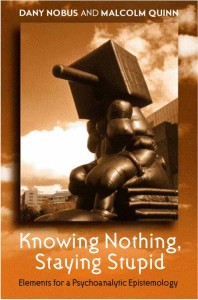Thinking about Identity
‘[truth] is the medium in which the subject is spoken of, and the bearer of this medium is not primarily the analysand but, as Quinn and Nobus make clear, the analyst.’
Joseph D. O’Neil, ‘The Shame of the Political: Truth as Vocation in Garcián, Lacan and Badiou’ Angelaki 17:1 (2012) 95
In this book, Professor Dany Nobus and I worked through a set of methodological issues in the application of psychoanalysis as a body of knowledge. We argued that psychoanalysis has no knowledge that can be applied in straightforward way by academic disciplines and that it should be understood as knowledge ‘in check’. Professor Nobus examined the status of psychoanalytic research through a reading of Freud’s late essay ‘The Question of a Weltanschauung’ of 1932, in which Freud argues that psychoanalysis is not a worldview and that all worldviews that profess to achieve coherence are idealistic and illusory. Through a reading of Jacques Lacan’s seminar XVII, I argued that psychoanalysis is not a theoretical model that is applied to a real world situation but is best defined as a form of the social bond in which stupidity and the fall of knowledge become productive. I later developed some of these themes into a chapter on psychoanalysis and research in the arts for The Routledge Companion to Research in the Arts. Knowing Nothing, Staying Stupid is now frequently cited in a variety of disciplinary contexts from management studies to art education.
Select Citations
Angie Voela, ‘Catastrophe Survived? The Failure of the Tragic in Moira Buffini’s Welcome to Thebes’Somatechnics (3:1) 2013, pp.133-148
Joseph D. O’Neil, ‘The Shame of the Political: Truth as Vocation in Gracian, Lacan and Badiou’ Angelaki (17:1) 2012, pp.83-98
Gilles Arnaud, ‘The Contribution of Psychoanalysis to Organization Studies and Management: An Overview’Organization Studies (33:9) 2012, pp.1121-1135, p.1124
Claudia Lapping, Psychoanalysis in Social Research: Shifting Theories and Reframing Concepts, London: Routledge 2012 p.11
Ian Parker, Lacanian Psychoanalysis: Revolutions in Subjectivity, London:Routledge 2011 pp. 78, 179
Fabio Vighi, On Zizek’s Dialectics, London: Continuum 2010 p.127, 131
Karen R. Malone and John L. Roberts ‘In the World of Language but not of It: Lacanian Inquiry into the Subject of Discourse Psychology’, Theory Psychology (20:6) 2010, 723-731, p.835
Stephen Frosh, ‘Psychoanalytic Perspectives on Identity’ in S. Frosh (ed.) The Sage Handbook of Identities, London: Sage 2010, p.39
Victoria Grace, ‘The Desiring, Gendered Speaking being: Going a Bit Further with Ussher on Women and Depression’ Feminism & Psychology (20:2) 2010, pp.272-277, pp. 274-5
Sidney Walker ‘Artmaking, Subjectivity and Signification’ Studies in Art Education (51:1) 2009
Books
2005 With Professor Dany Nobus: Knowing Nothing, Staying Stupid: Elements for a Psychoanalytic Epistemology, London: Routledge
Peer-reviewed journal articles
2013 ‘Stupidity is Anything At All’ Parallax (19:3) pp. 70-82
2007 ‘Who Are You Kidding?’ Review article in Journal For Lacanian Studies, 2007 (5:1) pp. 136-141
Book Chapters
2013 ‘Art and Psychoanalysis (Among Other Discourses)’ in Kivland, S. and Segal, N. (eds.) Vicissitudes: Histories and Destines of Psychoanalysis, London: IGRS/UCL
2011 ‘Chigurh’s Haircut: Three Dialogues on Provocation’ in Corris, M. Joseph-Lester, J. & Kivland, S. Transmission Annual: Provocation, London: Artwords Press
2010 ‘Insight and Rigor: A Freudo-Lacanian Approach’ in Biggs, M. & Karlsson, H. eds.The Routledge Companion to Research in the Arts, London: Routledge
Conferences
2008 ‘On Liberty and Art: Aesthetics and the Social Bond in Schiller and Lacan’ lecture for CLiC Circle for Lacanian Ideology Critique, Jan van Eyck Academy, Maastricht
25 November 2006 Chaired panel on ‘Psychoanalysis and the Arts’ as convenor for the arts for ‘Psychoanalysis the Arts and Humanities’ AHRC network event, Institute of Germanic and Romance Studies, School of Advanced Study Birkbeck, University of London
